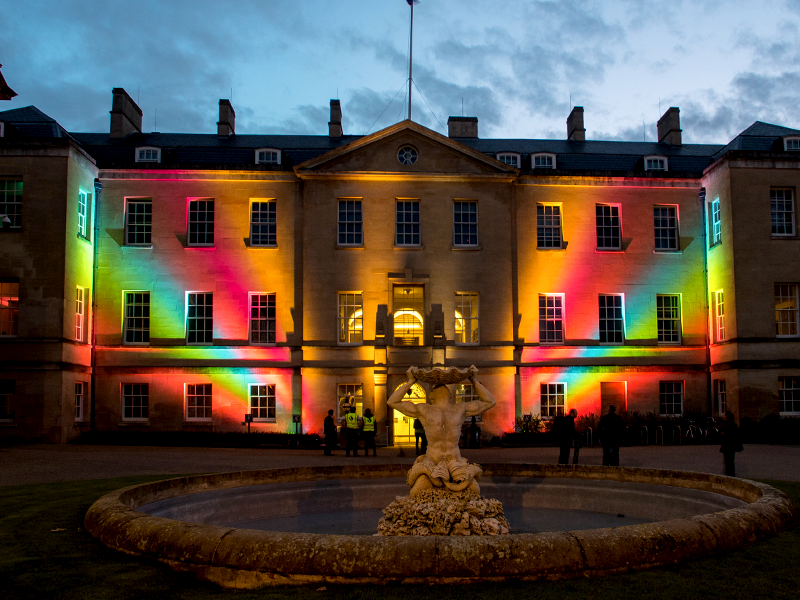Established in 2013 to stimulate, support and promote interdisciplinary research at Oxford, TORCH is now an intrinsic part of the Humanities Division, providing a creative space in which academics can come together and develop fresh, innovative approaches to their work.
'Administratively, in terms of faculties, the humanities appear to be divided into a rigid set of disciplines,' explains Professor Philip Ross Bullock, Director of TORCH (The Oxford Research Centre in the Humanities), 'but that doesn't necessarily reflect the way that people think, the way they work and the way they live.
'What unites the humanities – and allows us to interact with the other academic divisions – is, at heart, a series of questions about what makes us human,' he continues. 'These are often about things that we think of as being quite traditional humanities subjects, such as the study of texts, documents, languages and cultures, but the answers to those questions often take us into all kinds of curious and seemingly unrelated areas. What's exciting is the two-way dialogue that results.'
Not only did our earliest donors provide us with the money we needed to get things going, but they also helped to shape the vision. Their involvement was a vote of confidence in Oxford.Professor Philip Ross Bullock
In order to facilitate this dialogue, TORCH has developed a series of major research programmes and networks that reach out across the disciplines at Oxford. Covering topics ranging from the medical humanities to the politics of graphic novels, phenomenology and creative multilingualism, they bring together existing research groups and individuals to discuss, debate and incubate new ideas.
As Professor Bullock explains: 'In the field of the medical humanities, for instance, it's not just a case of thinking about how the humanities can borrow from the medical world, but how we can add to that conversation. How, say, do we deal with the diseases of maturity? Well, this could partly be a medical intervention, but it could also be an intervention about care and the quality of life. We as humanities scholars are well equipped to think about this – to think about the patient as a human being with a whole story, a whole set of fears, a whole metaphorical language to explain what they're going through.'

Although TORCH places great emphasis on promoting collaboration internally, it also encourages researchers to look beyond the bounds of the academy in search of new and more diverse audiences for their work. 'Our wider and public engagement role is something that's unique in the UK and in fact the worldwide university environment,' says Professor Bullock. 'Making the case for the humanities in a world where the debate around education often revolves around utility, social change or the STEM subjects is absolutely vital.'
In order to advocate for this on a local, national and international level, TORCH actively seeks out and nurtures relationships with external partners, including charities, cultural organisations, the media and policymakers. The centre also supports researchers wishing to deliver mutually-beneficial projects with external bodies, providing funding or support in-kind through its innovative Knowledge Exchange Fellowship Programme.
TORCH is able, through its advocacy and through its actions, to make a case for why the humanities matter – and that can mean economically, but also to our sense of who we are as human beings.Professor Philip Ross Bullock
These partnerships are a lifeline for researchers looking to multiply the impact of their work. In the last year alone, collaborations with museums, galleries, libraries and theatres resulted in more than 400 research-led events, drawing in audiences of over 16,000 people. As Professor Bullock explains though: 'It's not just a question of us going out into the world and telling people about our work. It is also about us being shaped by that dialogue, and learning ourselves to become better researchers.'
Experiential, hands-on-learning of this kind is the cornerstone of TORCH's approach, and is particularly important for those undertaking their first academic placement at the University. Working alongside the division's training team, TORCH actively engages early-career researchers in the work and leadership of its general programmes, as well as providing training and development opportunities to help them learn new skills. For those taking their first steps towards establishing successful careers in academia, this support can prove invaluable.
Whether working with early-career researchers or the most experienced academics, TORCH's drive to spark new ideas through interdisciplinary collaboration is unwavering. 'We're able to take the resources of Oxford, all the scholarly experience that you find here, and put that together with real-world problems,' says Professor Bullock. 'To have an institution that can do this, and at the same time broker relations between external partners and academics, and think about public engagement is a constant source of inspiration to me.'
TORCH relies on philanthropy to achieve its ambitious goals and is currently fundraising to secure its future through endowment.